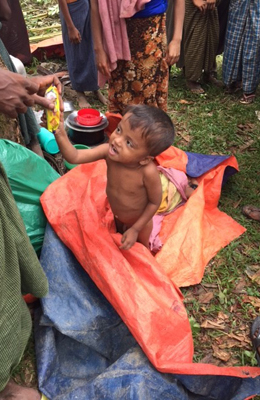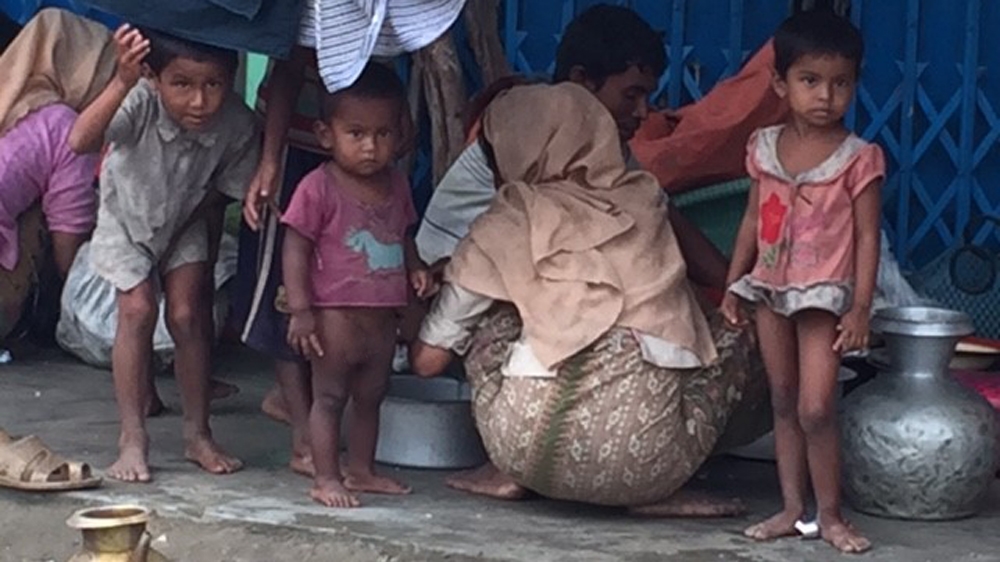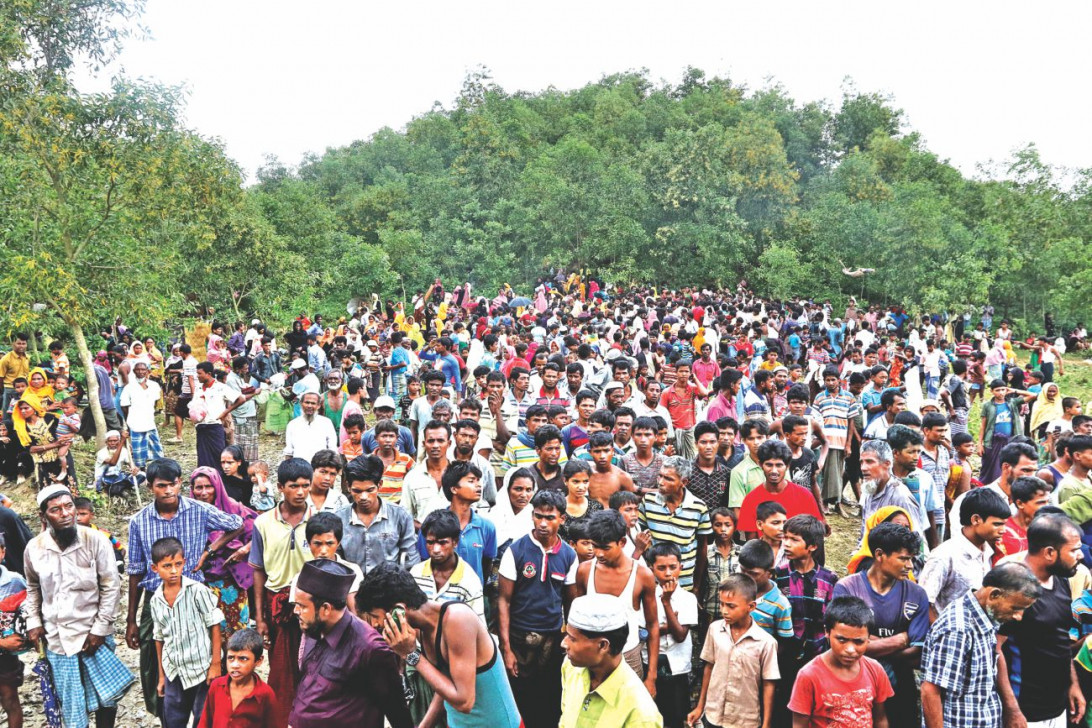Banglar Bir
SENIOR MEMBER

- Joined
- Mar 19, 2006
- Messages
- 7,805
- Reaction score
- -3
- Country
- Location
Rohingya pour into Bangladesh where tents stretch for kilometres
Thousands live in poor conditions near UN camps as aid agencies struggle to cope with the influx of refugees.
Divya Gopalan
Divya Gopalan is an Emmy nominee, international news anchor and correspondent for Al Jazeera English.
Kutapalong, Cox's Bazar - Everywhere you look, there are heartbreaking scenes.
A five-year-old sheltering his little brother from the rain; a little girl with only a skirt and no blouse; a baby chewing his hand because he is so hungry and cannot cry any more; and a grandmother sobbing because she has outlived most of her children and grandchildren.
Well before the Rohingya Muslims started arriving in Kutapalong in late August, the United Nations camps in the area were full to the brim.
THE STREAM: Who will save the Rohingya?
The men, women and children fleeing violence in Myanmar were forced to put up tents outside, lining the streets to the settlement.
Now, three weeks later, the makeshift shelters stretch for kilometres.

More than 270,000 Rohingya, a large percent of them women and children, have fled to Bangladesh in the last two weeks [Divya Gopalan/Al Jazeera]
'No idea where we'll go'
When we arrived at the camp, just a short distance away from the Bangladesh-Myanmar border, a truck carrying mostly women and children stopped in front of us.
I counted five babies under the age of one.
This was the end of a five-day journey to safety.
We met a family that had just arrived the previous day. They managed to set up in a half-constructed shop - three walls and no roof, but at least it wasn't in the mud.
A woman was cooking their meal for the day, a few handfuls of rice over an open fire. She told us the group fled after their village was burned down, but her husband and son died before they could escape.
But she told us she could not think of that now.
"We need food for the children," she said. "We have no idea where we will go from here, we are just following what everyone else is doing."
The UN says an "alarming" number of refugees have come into Bangladesh in the past two weeks. But the conditions they come into are also alarming.
READ MORE: Rohingya warn of 'another Srebrenica' if violence rages
Most do not have food or shelter; children run around half-naked; adults barefoot - all in torn clothes that tell the tale of their journey.
Families mark out any space they can with whatever they can find: pieces of tarpaulin, broken umbrellas, bits of plastic.
We spoke to a man putting up a tent using bamboo poles and plastic sheets. He said he bought them from a nearby market with money borrowed from a relative at the camp.

The Rohingya are widely reviled as illegal migrants from Bangladesh, despite having lived in Myanmar for generations [Divya Gopalan/Al Jazeera]
As we left, the rain started pouring, those with tents or cover made way for families and little children.
They all squeezed into the makeshift shelters, without an inch to spare, watching the rain come down.
Those with bottles or containers started collecting the rainwater, gulping it down as soon as they had enough to drink, then passing it around.
This is the only clean water they'll be getting.
Aid agencies say they do not have enough food or provisions, cautioning that it is just a matter of time before there is an outbreak of disease given the conditions the refugees are staying in - a warning that the worst of their journey may not be over.
AL JAZEERA WORLD: The Rohingya: Silent Abuse (45:33)
Source: Al Jazeera News
http://www.aljazeera.com/blogs/asia...tents-stretch-kilometres-170908143536507.html
Thousands live in poor conditions near UN camps as aid agencies struggle to cope with the influx of refugees.
Divya Gopalan
Divya Gopalan is an Emmy nominee, international news anchor and correspondent for Al Jazeera English.
Kutapalong, Cox's Bazar - Everywhere you look, there are heartbreaking scenes.
A five-year-old sheltering his little brother from the rain; a little girl with only a skirt and no blouse; a baby chewing his hand because he is so hungry and cannot cry any more; and a grandmother sobbing because she has outlived most of her children and grandchildren.
Well before the Rohingya Muslims started arriving in Kutapalong in late August, the United Nations camps in the area were full to the brim.
THE STREAM: Who will save the Rohingya?
The men, women and children fleeing violence in Myanmar were forced to put up tents outside, lining the streets to the settlement.
Now, three weeks later, the makeshift shelters stretch for kilometres.

More than 270,000 Rohingya, a large percent of them women and children, have fled to Bangladesh in the last two weeks [Divya Gopalan/Al Jazeera]
'No idea where we'll go'
When we arrived at the camp, just a short distance away from the Bangladesh-Myanmar border, a truck carrying mostly women and children stopped in front of us.
I counted five babies under the age of one.
This was the end of a five-day journey to safety.
We met a family that had just arrived the previous day. They managed to set up in a half-constructed shop - three walls and no roof, but at least it wasn't in the mud.
A woman was cooking their meal for the day, a few handfuls of rice over an open fire. She told us the group fled after their village was burned down, but her husband and son died before they could escape.
But she told us she could not think of that now.
"We need food for the children," she said. "We have no idea where we will go from here, we are just following what everyone else is doing."
The UN says an "alarming" number of refugees have come into Bangladesh in the past two weeks. But the conditions they come into are also alarming.
READ MORE: Rohingya warn of 'another Srebrenica' if violence rages
Most do not have food or shelter; children run around half-naked; adults barefoot - all in torn clothes that tell the tale of their journey.
Families mark out any space they can with whatever they can find: pieces of tarpaulin, broken umbrellas, bits of plastic.
We spoke to a man putting up a tent using bamboo poles and plastic sheets. He said he bought them from a nearby market with money borrowed from a relative at the camp.

The Rohingya are widely reviled as illegal migrants from Bangladesh, despite having lived in Myanmar for generations [Divya Gopalan/Al Jazeera]
As we left, the rain started pouring, those with tents or cover made way for families and little children.
They all squeezed into the makeshift shelters, without an inch to spare, watching the rain come down.
Those with bottles or containers started collecting the rainwater, gulping it down as soon as they had enough to drink, then passing it around.
This is the only clean water they'll be getting.
Aid agencies say they do not have enough food or provisions, cautioning that it is just a matter of time before there is an outbreak of disease given the conditions the refugees are staying in - a warning that the worst of their journey may not be over.
AL JAZEERA WORLD: The Rohingya: Silent Abuse (45:33)
Source: Al Jazeera News
http://www.aljazeera.com/blogs/asia...tents-stretch-kilometres-170908143536507.html




